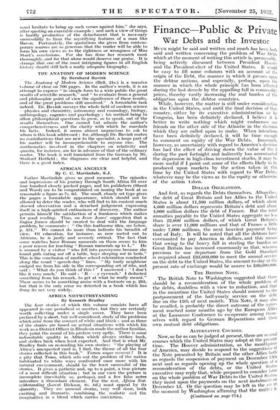Finance—Public & Private
War Debts and the Investor
MUCH might be said and written and much has been both said and written concerning the problem of War Debts which at the moment of writing this article is, presumably, being actively discussed between President Hoover and the President-elect of the United States. It would be easy to fill some columns with an account of the origin of the Debt, the manner in which it presses upon the debtor nations, and especially, perhaps, upon the manner in which the whole principle has been affected during the last decade by the appalling fall in commodity prices, thereby vastly increasing the real burden of th.e obligation upon the debtor countries. While, however, the matter is still under consideration in the United States, and until the final decision of that country, either by its executive, administration or by Congress, has been definitely declared, I believe it is better to write nothing which might embarrass our friends on the other side of the Atlantic in the decision which they arc called upon to make. When intentions have been definitely declared, it will be time enough to comment on equity of the War Debts. Inasmuch, however, as uncertainty with regard to America's decision has had the effect of driving down the value of the t during the past fortnight and indirectly has accentuated the depression in high-class investment stocks, it may be more useful if I point out some of the effects likely to be produced upon markets by the action taken at this time by the United States with regard to War Debts, whatever may be the views as to the equity or otherwise of the action taken.






































 Previous page
Previous page